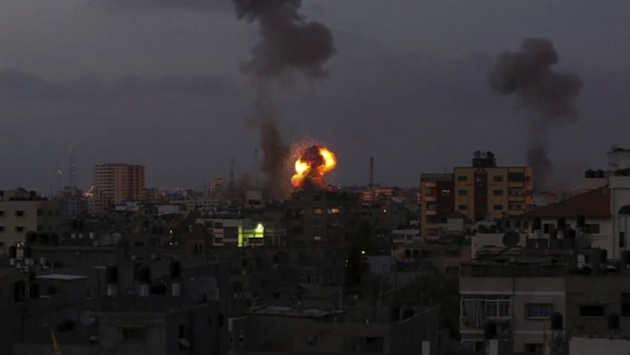

July 8, 2014: Smoke and a ball of fire rises after an Israeli missile strike in Beit Lahia, northern Gaza Strip. (AP Photo/Hatem Moussa)
The Israeli military confirmed early Wednesday that it it attacked more than 160 sites in Gaza on the second day of an offensive aimed at stopping Hamas rocket attacks “once and for all.” Now, Palestinian President Mahmoud Abbas is calling on the international community and the United Nations to “provide international protection” for the Palestinian people.
Targets struck were aimed at key cities across Israel, including 118 concealed rockets launching sites and six Hamas compounds. Several Hamas-controlled naval police targets, various national security compounds, 10 militant command centers, weapons storage facilities and 10 tunnels used for militant activity and to ferry supplies in from Egypt, were all included in the more than 400 sites in Gaza Israel has struck since the offensive launched Wednesday.
Meanwhile, Palestinian health officials claim at least 32 people have been killed in the strikes.
Israeli Army spokesman Lt. Col. Peter Lerner told reporters that the attacks are intended to take a “substantial toll” on Hamas and to severely limit its rocket-launching capability. He said the Israeli military would incrementally increase the attacks on Gaza, as what were growing concerns of strikes on Israel’s population centers have become a reality.
Tuesday night, Hamas lobbed roughly 160 rockets into Israeli territory, including one that had reached the northern city of Hadera, approximately 60 miles from Gaza. The BBC reported that rockets fired from Gaza reached Jerusalem late Wednesday, but fell without causing injury.
“The organization is going to pay for its aggression. It is literally holding us hostage with its rockets,” Lerner said. “The country is not willing for this situation to continue.”
Israeli Prime Minister Benjamin Netanyahu said Tuesday that continued increased rocket attacks against Israel from Hamas in the Gaza Strip would be met with overwhelming retaliation.
“I have ordered the military to significantly broaden its operation against Hamas terrorists and against the other terrorist groups inside Gaza,” Netanyahu said in a televised address.
Yitzhak Aharonovitch, the minister for internal security and a member of Netanyahu’s inner Security Cabinet said that Israel would not take the option to conduct a ground invasion off the table. “If we need to go inside in a ground operation, then we will do it. These things are on the table. These options exist. We will not stop anything until the rocket firing ends,” said Aharonovitch.
Thus far, the Israeli army authorized to activate up to 40,000 reservists for a potential ground offensive. Army officials said that about 1,000 soldiers were immediately activated, which adds to the 1,500 reservists previously called into active service.
Israel has not launched a ground offensive since 2009, and just two years earlier in 2007, Hamas seized control of the Gaza Strip from their former rival, Palestinian President Mahmoud Abbas. However, last month, Abbas formed a unity government backed by Hamas in order to hold on to power, which Netanyahu has said makes him responsible for their actions, including the murders of the three kidnapped teenagers that set off the latest round of violence.
Israel and Hamas eventually agreed to a cease-fire deal brokered by Egypt, which ended the fierce fighting back in late 2012. Abu Obeida, the masked spokesman for Hamas in Gaza, said Israel was in violation of that 2012 agreement, and demanded Israel stop the airstrikes.
“In the face of this aggression, we affirm that the Zionist enemy should not dream of calm and stability,” he said.
Yet, Palestinian President Mahmoud Abbas said Hamas wanted to deescalate the violence and restore peace to the region.
“I have been in contact with the regional and international parties in the last few days, particularly Hamas leaders in Gaza, and everyone I’ve talked to expressed his willingness to restore the truce and stop the escalation,” Abbas said.
Still, actions speak louder than words to Israeli military officials, who say the bombardment will continue until Hamas is either severely diminished, in surrender or destroyed.






